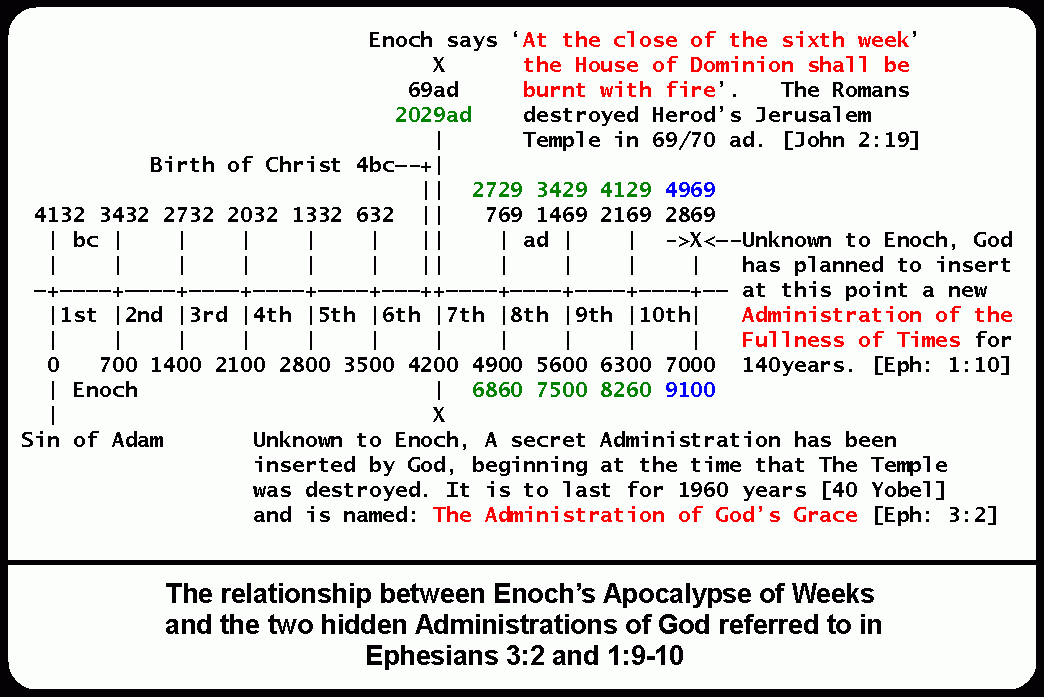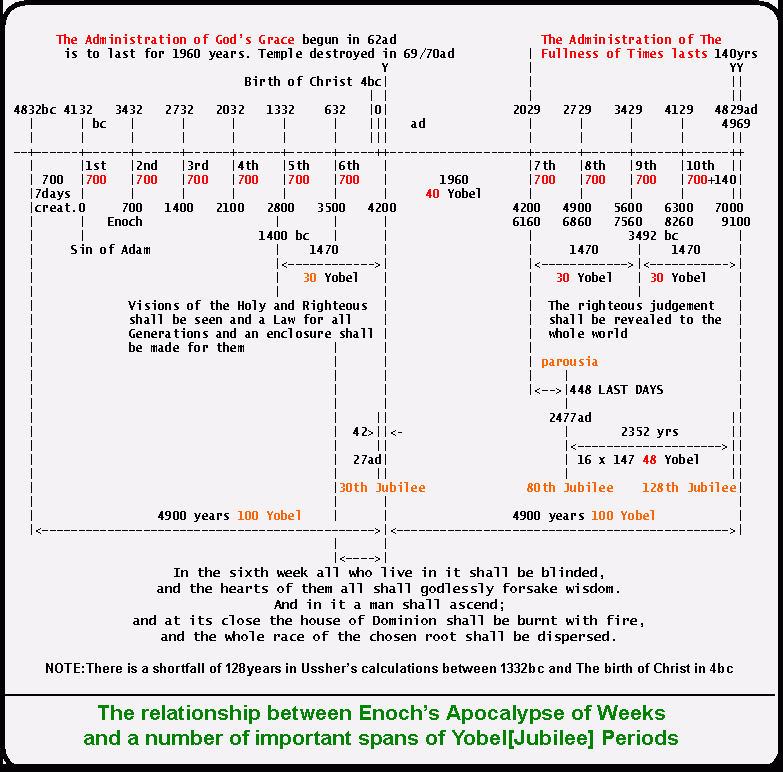The Relationship Between Israel's Life and Enoch's Apocalypse of Weeks
At the time of Christ’s first advent, The Book of Enoch was included in the Ancient Texts which were regarded as Inspired Scriptures. Unfortunately it fell into disrepute during the early Christian Era because of its apparently extreme and therefore misunderstood content and was therefore not included in The Holy Bible as we know it to-day. This rejection of its content could have also been influenced by Enoch’s statement that it was directed ‘to a remote generation which is to come.’
In the light of the present Spiritual knowledge of the Christian Scriptures, The Book of Enoch has again begun to be accepted as Inspired by God. Unfortunately, no original Hebrew text has yet been recovered. The best we have is a number of fragments of Etheopic, Greek and Latin texts. The Biblical Greek Scholar, R.H.Charles, has collected, collated and translated these into book form and in his preface to the second edition, he writes concerning the many improvements that he was able to incorporate:
The translation in the first edition was made from Dillmann's Edition of the Ethiopic text, which was based on five MSS. With a view to this translation, the present editor emended and revised Dillmann's text in accordance with nine hitherto uncollated Ethiopic manuscripts in the British Museum, and the Greek and Latin fragments which had just come to light, but not withstanding every care he felt his work in this respect to be of a wholly provisional character. From the date of the publication of the first edition in 1893 he steadily made preparation for an edition of the Ethiopic text and of the Greek and Latin fragments. This text which is exhaustive of existing textual materials in these languages, was published by the University Press in 1906, and from this text the present translation is made. A new and revolutionary feature in the translation is due to the editor's discovery of a poetical structure of a considerable portion of the work. I call it revolutionary; for such it proves to be in respect of the critical problems of the text. By its means the lost original of the text is not infrequently recovered, phrases and clauses recognised as obvious interpolations, and not a few lines restored to their original context, whose claims to a place in the text were hitherto ignored on the ground of the weakness of their textual attestation.
Because of the increased Spiritual knowledge concerning this book, I make no apology for the use in the following article, of a small section of these Scriptures called The Apocalypse of Weeks. These are ten weeks representing the activities of God and man between the birth of Adam and The Day of God. Each day of these ten weeks is taken to represent a hundred years. Modern theological criticism is unable to interpret the basis upon which these weeks are arranged because they fail to recognise the revelation of this present Administration of God's Grace. This was not revealed until about the year 69ad, having been 'hidden in God' before that time [Eph 3:9]. This Administration of God with all its activities is not therefore included in Enoch's Apocalypse of Weeks because it was not revealed to Enoch. Modern theological critics have therefore been unable to discern the True Spiritual nature of this prophesy.
There follows a note concerning the 'Era of the Creation of the World' taken from the secular Encyclopaedia Britannica:
As the Greek and Roman methods of computing time were connected with certain pagan rites and observances which the Christians held in abhorrence, the latter began at an early period to imitate the Jews in reckoning their years from the supposed period of the creation of the world. Various computations were made at different times, from Biblical sources, as to the age of the world; and Des Vignoles, in the preface to his Chronology of Sacred History, asserts that he collected upwards of two hundred different calculations, the shortest of which reckons only 3483 years between the creation of the world and the commencement of the vulgar era, and the longest 6984. The so-called era of the creation of the world is therefore a purely conventional and arbitrary epoch; practically, it means the year 4004 B.C.,—this being the date which, under the sanction of Archbishop Ussher's opinion, won its way, among its hundreds of competitors, into general acceptance.
It must be understood that 4004bc was determined by Bishop Ussher as the year in which Adam brought death upon mankind by disobeying God. The acceptance of the year 4004bc was based upon the Scripture statement: ‘One Day is with The Lord as a Thousand Years’, and 4bc being the true year of the birth of The Christ. It is at this point that the generations of the book of Genesis began. Up until now, this has been a good guide to the understanding of the timing of Old Testament events. It is also an approximate. base upon which we can now begin to relate the dates of the Old Testament events to those of Enoch's Apocalypse of Weeks.
Each of Enoch's ten weeks spans 700 years, making 7000 years in all. It spans the activities of God and man between the Sin of Adam and The Day of God. The opening of the latter event being at the end of the Book of The Revelation. The key event connecting the Bible Scripture history and the verses of Enoch's Apocalypse of Weeks being the destruction of The Jerusalem Temple in 69/70ad. This event comes at the close of Enoch's sixth week, indicating that from this event, six weeks of 700 years per week [4200yrs] takes us back to the date of Adam's sin. From the 4200 we must subtract 69 being the date [69/70ad] when the Temple was destroyed, [minus 1...adjustment bc to ad…..no zero year] which gives us 4132 years bc as the date of Adam’s sin.
In the following chart on page 4, these years of Enoch's Apocalypse are shown running parallel to the 'Anno Domini'[ad] and 'Before Christ'[bc] dating: The length of each of Enoch's ten weeks is recognised as a period of 700 years. Thus the total time known to Enoch was limited to 7000 years.

All the Old Testament ages and time spans running up to that of the Temple's destruction are shown in leaflet By Grace Nos.9 & 10. The corresponding summation of the years of the patriarchs is shown in By Grace leaflet No. 8.
God uses meaningful numbers throughout Scripture. We readily recognise the number 40 as a period of time, days, weeks, or years, during which probation, trial and chastisement are applied. 49 is the fixed span of time of Israel’s Jubilees or Yobels. It is also used by God as a measure of time independent of these spans. It could be said that it is God’s most important means of measuring time.
The Scripture tells us that the Jews, The House of Judah, now await the return of their Spiritual sight [Isaiah 35:5-5], having been deprived of it in 62ad [Acts 28:27]. This undoubtedly is the application of a period of God’s probation, trial and chastisement The question is, how many of these periods of 40 years must be applied in this case? The most outstanding number of periods is of course that of the Jubilees, 49.
Should we therefore multiply the periods of the chastisement by the Jubilees, that is 40 x 49 we recognise the time span of one of the most important periods of time in which God has been silent in His relationship with Israel. This span of time is 1960 years. Having put Israel aside during this period, God introduced a secret activity whilst dealing with mankind, that of actively displaying His Grace only [Ephesians 3:2, 7-8].
God also plans to complete all of His work before introducing of The Day of God. The apostle Paul tells us that it is called The Administration of the Fullness of Times [Ephesians 1:9-10]. Neither this present Administration of God’s Grace [’hid in God’ Eph 3:9] nor the Administration of the Completeness of Times [Gk: kairos Eph:1:10 (cp. Gk: chronos Rev 10:6-7) ] were known to Enoch.
With the addition of these two hidden Administrations, 1960yrs for that of God's Grace and 140yrs for that of The Fullness of Times, we arrive at an end date of 4969ad when The Day of God is introduced [9100 years from the sin of Adam]. The chart that follows shows these two Administrations as gaps in Enoch's timings.
For the seven days of God’s creation, forming and resting, each day is reckoned as 100 years in keeping with those of Enoch’s Apocalypse of Weeks. Thus a further 700years is added before these Weeks to incorporate the 7 days of God's work on the Earth. It was on the morning following the seventh day of God’s rest that God discovered Adam's sin which thereby brought death upon all.

The total span of time is therefore 9800years which splits exactly into two equal parts at the time of The Temple's destruction. Each part is 10 x [49] of years, 4900 years
Even knowing that the days of Jacob are a reflection of The Years of the life of all the Tribes of Israel [see By Grace No.5], still leaves many questions unanswered, but all the dates of the events in the Apocalypse are true to the Old Testament timings [see leaflet By Grace No15] The table on page 6 shows the principle events with dates and references:
| WEEK No. | SPAN | EVENT | DATE | BIBLE REF |
|---|---|---|---|---|
| 1 | 4132 TO 3432 BC | And Enoch began to recount from the books and said: 'I was born the seventh in the first week, while judgement and righteousness still endured' | 3510 BC | Genesis 5:6-24 |
| 2 | 3432 TO 2032 BC | And after me shall arise in the second week great wickedness | 3382 BC | Genesis 6:3-5 |
| 3 | x | x | ||
| 4 | x | x | ||
| 5 | x | x | ||
| 6 | x | x | ||
| Admin of God's Grace | 69 AD to 2029 AD | Paul says: If you have heard of the Administration of the Grace of God which is given to me for you... by revelation He made known to me the mystery, which in other generations was not made known to the sons of men. | 69 AD | Ephesians 3:1-12 |
| 7 | 2029 TO 2729 AD | And after that in the seventh week shall an apostate generation arise. And many shall be its deeds and all its deeds shall be apostate. | Deuteronomy 31:29 | |
| 8 | x | x | ||
| 9 | x | x | ||
| 10 | x | x | ||
| Admin of the fullness of times | 4829 TO 4969 AD | God might gather together in one all things in Christ, both which are in heaven, and on Earth; even in Him | 4969 AD | Ephesians 1:10 |